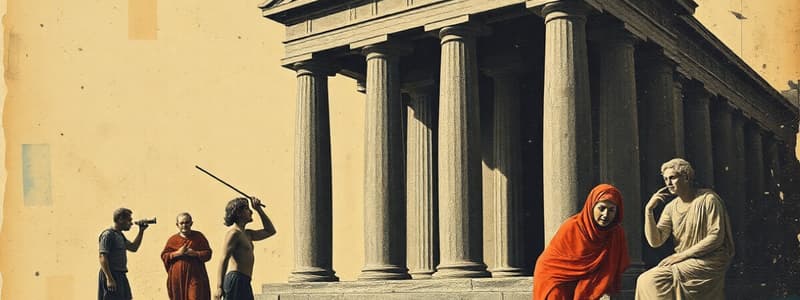Podcast
Questions and Answers
Який з цих елементів НАЙБІЛЬШЕ характеризує структуру грецької комедії?
Який з цих елементів НАЙБІЛЬШЕ характеризує структуру грецької комедії?
- Історичні події
- Релігійні ритуали
- Сатиричний зміст (correct)
- Трагічний конфлікт
Яка риси є характерною для фарсичних елементів в комедії?
Яка риси є характерною для фарсичних елементів в комедії?
- Нехтування соціальними нормами (correct)
- Драматичний розвиток персонажів
- Сумнісність та трагізм
- Складна сюжетна конструкція
Яка роль Діонісійських фестивалів для розвитку комедії?
Яка роль Діонісійських фестивалів для розвитку комедії?
- Підтримка освітніх програм
- Заохочення приватних театральних вистав
- Просування публічних вистав театру (correct)
- Сприяння релігійним обрядам
Який з елементів вважається основним у походженні комедії?
Який з елементів вважається основним у походженні комедії?
Який вклад Арістофана є найбільш значущим у розвитку античної комедії?
Який вклад Арістофана є найбільш значущим у розвитку античної комедії?
Яка структура комедії відрізняється від трагедії?
Яка структура комедії відрізняється від трагедії?
Що таке фарс у комедії?
Що таке фарс у комедії?
Який з елементів комедії має функцію звернення хору до публіки?
Який з елементів комедії має функцію звернення хору до публіки?
Хто з цих постатей вважається першим комедіографом античної літератури?
Хто з цих постатей вважається першим комедіографом античної літератури?
Яка з наведних характеристик не є ознакою фарсу?
Яка з наведних характеристик не є ознакою фарсу?
Яке з нижчевказаних визначень найкраще описує роль свята Діоніса в комедії?
Яке з нижчевказаних визначень найкраще описує роль свята Діоніса в комедії?
Яка з цих концепцій не відноситься до теорії смішного Арістотеля?
Яка з цих концепцій не відноситься до теорії смішного Арістотеля?
Яка з цих рис не характеризує комедійні фарси?
Яка з цих рис не характеризує комедійні фарси?
Яка з наведених характеристик найкраще описує структуру давньогрецької комедії?
Яка з наведених характеристик найкраще описує структуру давньогрецької комедії?
Який з перерахованих елементів вважається характерним для фарсичних елементів у давньогрецькій комедії?
Який з перерахованих елементів вважається характерним для фарсичних елементів у давньогрецькій комедії?
Яка роль Діонісійських фестивалів у розвитку давньогрецької комедії?
Яка роль Діонісійських фестивалів у розвитку давньогрецької комедії?
Що стало основною причиною виникнення давньогрецької комедії?
Що стало основною причиною виникнення давньогрецької комедії?
Який внесок зробив Арістофан в розвиток давньогрецької комедії?
Який внесок зробив Арістофан в розвиток давньогрецької комедії?
Яка з наведених рис є основною у комедіях Арістофана?
Яка з наведених рис є основною у комедіях Арістофана?
Яка з цих рис не є характерною для давньогрецької комедії?
Яка з цих рис не є характерною для давньогрецької комедії?
Який з наведених елементів найчастіше зустрічається в комедіях Арістофана?
Який з наведених елементів найчастіше зустрічається в комедіях Арістофана?
Flashcards
Комедія (антична)
Комедія (антична)
Жанр античного театру, що має структуру, відмінну від трагедії. Включає пролог, парод, агон, парабасу, сцени з епісодами та стасімами, ескод.
Пролог (комедія)
Пролог (комедія)
Вступ до комедії, що пояснює її зміст і суть.
Агон (комедія)
Агон (комедія)
Суперечка чи змагання між персонажами в комедії.
Парабаса (комедія)
Парабаса (комедія)
Signup and view all the flashcards
Фарс
Фарс
Signup and view all the flashcards
Арістофан
Арістофан
Signup and view all the flashcards
Арістотель
Арістотель
Signup and view all the flashcards
Катарсис
Катарсис
Signup and view all the flashcards
Антична література
Антична література
Signup and view all the flashcards
Літературні роди
Літературні роди
Signup and view all the flashcards
Міфи в античній літературі
Міфи в античній літературі
Signup and view all the flashcards
Публічність античної літератури
Публічність античної літератури
Signup and view all the flashcards
Віршована форма в античності
Віршована форма в античності
Signup and view all the flashcards
Античність як літ. епоха
Античність як літ. епоха
Signup and view all the flashcards
Давньогрецькі літературні жанри
Давньогрецькі літературні жанри
Signup and view all the flashcards
Герой. епос Гомера
Герой. епос Гомера
Signup and view all the flashcards
Композиція «Іліади» та «Одісеї»
Композиція «Іліади» та «Одісеї»
Signup and view all the flashcards
Засоби передачі почуттів Сапфо
Засоби передачі почуттів Сапфо
Signup and view all the flashcards
Аттичний театр
Аттичний театр
Signup and view all the flashcards
Аристотель про трагедію
Аристотель про трагедію
Signup and view all the flashcards
Етапи розвитку давньогрецької трагедії
Етапи розвитку давньогрецької трагедії
Signup and view all the flashcards
Study Notes
Questions for Exam
- Ancient Antiquity as a historical and literary era: A detailed exploration of ancient times as a period of literary development.
- Stages of ancient Greek Literature: The evolution of epic, lyrical, and dramatic forms within ancient Greek literature.
- Characteristics of Homeric Epic Poetry: Key features of Homer's epic poems, including "Iliad" and "Odyssey," and a comparison of their structures.
- Comparative analysis of Homer's "Iliad" and "Odyssey": Examining the composition and plot of Homer's epic poems and the similarities and differences between them.
- Expression of Love in Sappho's Poetry: Analysis of Sappho's lyrical expression of love.
- Ancient Greek Theatre and Drama: An overview of Greek theatre, including its specific forms and attributes.
- Origins and Development of Tragedy: Analysis of the evolution of Greek tragedy through the works of Aeschylus, Sophocles, and Euripides, including changes in structure, actors, and themes.
- The Concept of Catharsis: A discussion of the concept of catharsis in Greek tragedy.
- Conflict in Aeschylus' "Prometheus Bound": Analysis of the conflict between Prometheus and Zeus.
- Sophocles' "Oedipus Rex": Exploration of the conflict between human knowledge and divine fate, and tragic irony.
- Euripides' "Medea": Analyzing the play as a "tragedy of passion" and the depiction of Medea's psychology.
- Ancient Athenian Comedy: A discussion of the evolution of Athenian comedy, referencing Aristophanes' works.
- Roman Literature: Focused study of Roman literature during the Augustan period.
- Comparison of Epic Poetry and Romance: Comparison of heroic epic poetry and the romance genre.
- Medieval Literature: Detailed examination of the origins, development, components, and characteristics of medieval literature, including its unique worldview.
- Courtly Love and Chivalry: Explaining the concepts of courtly love and chivalry in medieval literature.
- Medieval City Literature: A discussion of the origins and different genres of literature of medieval cities.
- Dante's "Divine Comedy": Examining Dante's "Divine Comedy" through the lens of his fourfold interpretation (the four-fold scheme).
- Renaissance Literature: Characterizing the literature of the Renaissance and its innovative features.
- Evolution of Shakespeare's Drama: Categorization of different stages of Shakespeare's stagecraft and his evolution through his works from Renaissance to Baroque.
- Shakespeare's Comedies in the 1590s: Exploring the themes of these plays with the characters and situations as the primary means of comedy.
- Shakespeare's Major Trageities and the concept of "Man": Explanation of the exploration of "Man" through the tragedies "Hamlet" and "King Lear".
- Shakespeare's "The Tempest": Characterizing the themes of this play as a complex intertwining of real and unreal, and the portrayal of the characters.
- Cervantes' “Don Quixote”: Interaction between the social and chivalric models in the novel.
- Spanish Golden Age Drama: An exploration of Spanish drama during its Golden Age.
- Dramatic Genres of the Spanish Golden Age: Categorization and exploration of various dramatic genres, focusing on the use of intrigue, in Spanish 17th-century drama.
- The Role of Fate in Vergilian Poetry: Detailed work on the influence of fate on Aeneas' life according to Vergilian poetic vision.
- Medieval Literary Genres: Comprehensive analysis of different literary genres in the medieval period.
- The Concept of "Picaresque Novel": Exploration of a specific novel subgenre of the medieval period.
- Evolution of Shakespeare's Style: Genre Progression and Shift in Focus: Identifying a transition in Shakespeare's playwriting style throughout his career.
Studying That Suits You
Use AI to generate personalized quizzes and flashcards to suit your learning preferences.





